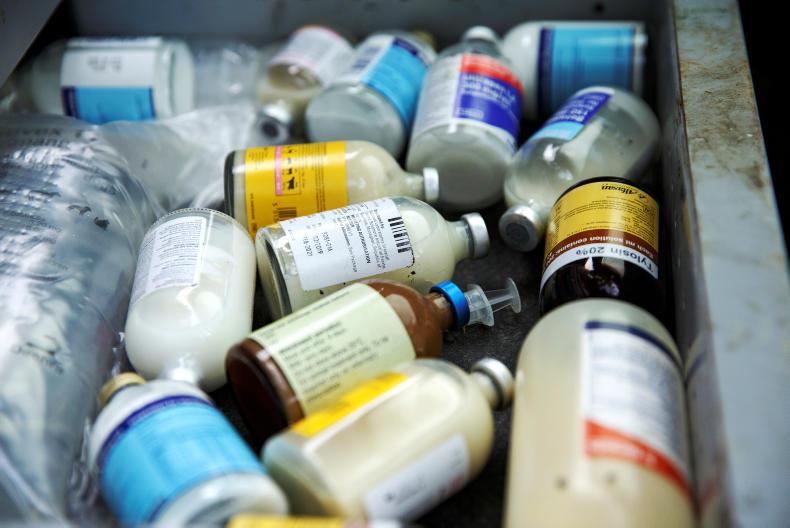The trend of corporate bodies purchasing several veterinary practises in one area can cause a monopoly of services and perhaps, as a result of new vet rules, a monopoly of veterinary products brands, the Joint Committee on Agriculture has warned.
The comments came as part of the Committee’s new report Proposed Regulation of Veterinary Medicines in Ireland.
Committee chair Jackie Cahill TD, said: “Some key issues arose in relation to the role of responsible persons, the possibility for anti-competitive practices and increased costs to farmers."
The report identifies key findings and recommendations from four days' worth of hearings with relevant stakeholders between November 2020 and April 2021 to discuss the Veterinary Medicines Regulation which will come into effect in January 2022.
The Regulation legislates for the authorisation, use and monitoring of veterinary medicinal products in the EU. It came into effect on 28 January 2019 and come into force in all EU Member States on 28 January 2022.
The report details 10 key recommendations and observations for the Department of Agriculture and Minister Charlie McConalogue, there are:
The Committee recommends that the Department of Agriculture ensures the continuation of the existing network, which includes licensed merchants and veterinary pharmacists.The Committee recognises the importance of services that licensed merchants and veterinary pharmacists provide to rural communities and the farming sector which are performed to a high standard.If it is not possible to avail of a derogation, the Department needs to explore further a possible adoption of a mechanism to allow responsible persons play a role alongside veterinary practitioners in the prescribing and dispensing of antiparasitic medicines.With the introduction of this regulation there could be an issue of receiving prescriptions in a timely manner as the demand of access to veterinary surgeons will increase.The trend of corporate bodies purchasing several veterinary practises in one area is disconcerting as this can cause a monopoly of services and perhaps, as a result of the anticipated change, a monopoly of veterinary product brands.The Committee heard that this regulation could be anti-competitive and may result in increased costs for farmers. The Committee recommends that veterinary practitioners should not list their preferred branded medicine in their prescriptions to clients. Public awareness is required in relation to antimicrobial and antiparasitic resistances and the difference between the two needs to be highlighted.
The Committee recognises the roles of veterinary practitioners, veterinary pharmacists and licensed merchants in the provision of advice and animal healthcare products.Separation of prescribing and dispensing as advocated by ICOS [ Irish Co-operative Organisation Society], ILMA [Independent Licensed Merchants Association], IPU [Irish Pharmacy Union] has been a proven success. Other EU Member States such as Denmark, Sweden and Italy have implemented this option.
The qualifications, employments and livelihoods of suitably qualified responsible persons will be put in jeopardy by the failure of the Department to facilitate their continued role in the prescribing of antiparasitic veterinary medicines.
The trend of corporate bodies purchasing several veterinary practises in one area can cause a monopoly of services and perhaps, as a result of new vet rules, a monopoly of veterinary products brands, the Joint Committee on Agriculture has warned.
The comments came as part of the Committee’s new report Proposed Regulation of Veterinary Medicines in Ireland.
Committee chair Jackie Cahill TD, said: “Some key issues arose in relation to the role of responsible persons, the possibility for anti-competitive practices and increased costs to farmers."
The report identifies key findings and recommendations from four days' worth of hearings with relevant stakeholders between November 2020 and April 2021 to discuss the Veterinary Medicines Regulation which will come into effect in January 2022.
The Regulation legislates for the authorisation, use and monitoring of veterinary medicinal products in the EU. It came into effect on 28 January 2019 and come into force in all EU Member States on 28 January 2022.
The report details 10 key recommendations and observations for the Department of Agriculture and Minister Charlie McConalogue, there are:
The Committee recommends that the Department of Agriculture ensures the continuation of the existing network, which includes licensed merchants and veterinary pharmacists.The Committee recognises the importance of services that licensed merchants and veterinary pharmacists provide to rural communities and the farming sector which are performed to a high standard.If it is not possible to avail of a derogation, the Department needs to explore further a possible adoption of a mechanism to allow responsible persons play a role alongside veterinary practitioners in the prescribing and dispensing of antiparasitic medicines.With the introduction of this regulation there could be an issue of receiving prescriptions in a timely manner as the demand of access to veterinary surgeons will increase.The trend of corporate bodies purchasing several veterinary practises in one area is disconcerting as this can cause a monopoly of services and perhaps, as a result of the anticipated change, a monopoly of veterinary product brands.The Committee heard that this regulation could be anti-competitive and may result in increased costs for farmers. The Committee recommends that veterinary practitioners should not list their preferred branded medicine in their prescriptions to clients. Public awareness is required in relation to antimicrobial and antiparasitic resistances and the difference between the two needs to be highlighted. The Committee recognises the roles of veterinary practitioners, veterinary pharmacists and licensed merchants in the provision of advice and animal healthcare products.Separation of prescribing and dispensing as advocated by ICOS [ Irish Co-operative Organisation Society], ILMA [Independent Licensed Merchants Association], IPU [Irish Pharmacy Union] has been a proven success. Other EU Member States such as Denmark, Sweden and Italy have implemented this option.
The qualifications, employments and livelihoods of suitably qualified responsible persons will be put in jeopardy by the failure of the Department to facilitate their continued role in the prescribing of antiparasitic veterinary medicines. 





 This is a subscriber-only article
This is a subscriber-only article











SHARING OPTIONS: